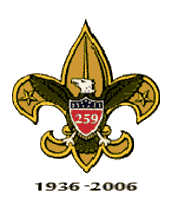Eagle Scout Rank Alternate Requirements
- The Eagle Scout rank may be achieved by a Boy Scout, Varsity Scout, or qualified
Venturer who has a physical or mental disability by qualifying for alternate merit badges.
This does not apply to individual requirements for merit badges. Merit badges are awarded
only when all requirements are met as stated.
 |
In order for a Venturer to be an Eagle candidate, he must have achieved the First Class
rank
as a Boy Scout or Varsity Scout. |
- The physical or mental disability must be of a permanent rather than a temporary nature.
- A clear and concise medical statement concerning the Scout's disabilities must be made
by a physician licensed to practice medicine, or an evaluation statement must be certified
by an educational administrator.
- The candidate must earn as many of the required merit badges as his ability permits
before applying for an alternate Eagle Scout rank merit badge.
- The candidate must complete as many of the requirements of the required merit badges as
his ability permits.
- The Application for Alternate Eagle Scout Award Merit Badges must be completed prior to
qualifying for alternate merit badges.
- The alternate merit badges chosen must be of such a nature that they are as demanding of
effort as the required merit badges.
- When alternates chosen involve physical activity, they must be approved by the
physician.
- The unit leader and the board of review must explain that to attain the Eagle Scout rank
a candidate is expected to do his best in developing himself to the limit of his
resources.
- The application must be approved by the council committee responsible for advancement,
utilizing the expertise of professional persons involved in Scouting for the disabled.
- The candidate's application for Eagle must be made on the Eagle Scout Rank Application,
with the Application for Alternate Eagle Scout Award Merit Badges attached.
Source: Boy Scout Requirements, #33215, revised 2004

|


